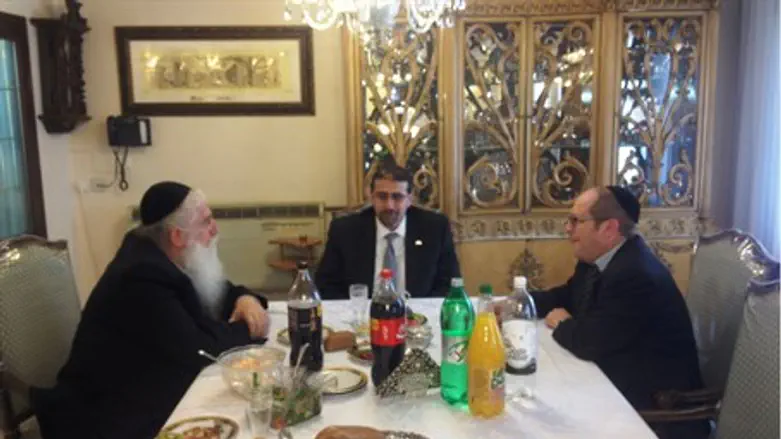
In a continuation of previous meetings, Knesset Member (MK) Rabbi Meir Porush of Agudat Yisrael, the body that represents the hareidi-religious community in Israel, has hosted the US Ambassador to Israel Dan Shapiro in his home in Jerusalem.
What was intended to be a routine meeting to forge closer understanding, was dominated by discussion about the conscription law, the political process and recent developments in Syria.
The Ambassador wanted to know the mood and attitude of the hareidi public about Israel's decision to enlist hareidi men for army service. He stressed that the U.S. did not intervene in Israeli internal matters, but wanted and needed a strong Israel not only in military terms but also internally, typified by internal cohesion and shared understandings.
Rabbi Porush described efforts to force yeshiva students to work or serve in the army, as most other Israelis do, as triggering an existential battle.
"When our rabbis feel that there is an attempt to change our way of life they will call for a religious war," he warned.
"I've told Bayit Yehudi (Jewish Home) Party Knesset members this in the past," Porush added, "'Don't try and test us,' it will be a very, very harsh battle. That is my task in these times, to send that message out to everyone. If there will be a law here, that we see as forcing us to enlist (in the IDF) the rabbis will call for a religious war."
Porush also asked the Ambassador to convey this message to the U.S. administration.
"They shouldn't be at all surprised. If there is forced conscription, the rabbis will see this as trying to change the way of life of the hareidi community and it will bring deep turmoil to Israel."
Rabbi Porush added that Jews had the right to fulfill the edict in the Torah that calls upon them to learn words of Torah throughout the day and night, comparing the efforts of the current government to prevent Torah learning with communist regimes who didn't allow Jews to follow religious practices.
When asked about his views of the current political process between Israel and the Palestinian Arabs, Porush answered, "The Palestinians aren't able to make peace. Abu Mazen (Mahmoud Abbas) is scared of the extremists and I don't have any expectations of the current political process."
"I can say," he added, "When Sadat (Anwar Sadat, a former Egyptian president) said there wouldn't be war in negotiations Menahem Begin (former Israeli prime minister) moved towards him and there was peace, but now when you're speaking about people who aren't even saying they want peace, and are preparing their children for a path of terror and hatred of Jews, there's no point to negotiations with them."
In the course of the meeting Rabbi Porush added that along with a delegation from the U.S. Embassy he had recently visited the city of Beitar Illit near Jerusalem, which according to all sides would not be a part of negotiations, but nevertheless had been slapped with a building freeze leaving young couples with nowhere to live.
In relation to the situation in Syria, Shapiro said there needed to be a strong international reaction against the use of chemical weapons citing the recent attack of August 21 which he said killed hundreds of children.
"We need it to be known that there is a price for this. What will Iran and Hezbollah learn from the lack of a response?" He added: "Even if there isn't great public support, the President senses a great danger that exists in a in a failure to respond."
In conclusion to the meeting Porush and Shapiro agreed to continue discussions, strengthen ties and table dates for future meetings.